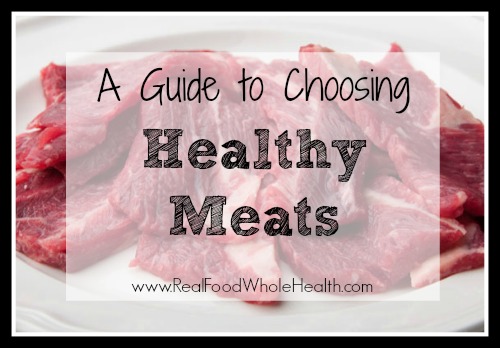
A Guide to Choosing Healthy Meats
- Choose meat that has been raised locally and sustainably, without the use of hormones or antibiotics, and from animals eating their native, species-appropriate diet.
- If you cannot find grass-finished meat, grass-fed/grain-finished meat can be substituted, but is not optimal.
- Beef, bison/buffalo and lamb should be grass-fed and grass-finished, not grain-fed (or “corn-fed”). Eat wild game if you have access to it- there is a wide variety to be found.
- Choose pastured or foraged pork and poultry. These animals are natural omnivores and should not subsist on vegetarian, genetically modified (GMO) grain/corn and soy-based diets They should be given free access to the outdoors, sunshine and foraging for insects and grass.
- “Vegetarian fed” typically means that the animal was given soy/corn/grain- almost all of which is GMO and is not a natural diet for the animals.
- “Natural” is an unregulated and popular marketing term in the food industry. Do not rely on this label to guide you to healthful foods.
- “Organic” meats may not have received GMO feed, but the organic label does not guarantee that the animal was grass-fed/pastured or otherwise raised in a sustainable manner. However, organic meats are better than conventional meats.
- Eat the fat! Fat of properly raised animals contains more essential fatty acids than their industrial counterparts. You may render the fat of these animals and use it in baking or cooking- like lard from pastured pork.
- Organ meats from healthy animals are extremely nutrient-dense and have always been a treasured part of traditional diets. Grass-fed beef liver is especially healthful. If you do not care for the taste of liver, try grating frozen liver into ground grass-fed beef for patties, meatballs, sauces or soups-you won’t taste it but you will reap the benefits.
- Always cook meats with bones whenever possible to impart additional nutrition (and flavor!). Save the leftover bones to make rich, nourishing bone broth/stocks. Opt for skin-on, bone-in pastured poultry, rather than boneless, skinless breasts.
- While all meats should be prepared properly with care, to avoid burning or charring for example, new research indicates that pork requires some specific preparation. Bacon and sausages should be prepared without nitrates or nitrites, also referred to as “uncured”. Fresh pork (like pork chops or roasts) should be marinated overnight in an acidic solution, like apple cider vinegar, before cooking to eliminate a detrimental effect on the blood and body. Read more about this issue here.
- Processed meats, like most luncheon or deli meats, should be avoided. There are some acceptable cured-type meats on the market, like traditionally made Italian style foods- pancetta, prosciutto, salami, etc. Always check the ingredients and the quality of the meat (should be pastured) and avoid the industrially produced versions of these foods.


It really helped when you mentioned how beef and lamb should be grass fed and not grain fed in order to get the best nutrition you can. I can see that taking the time to understand this can help you get the best flavors and enjoy your meat better. Personally, I would want to make sure I take the time to do some research and find out where I can get the best quality beef so my family stays away from GMOs and such.
I’ve been looking into a few different options for beef for my family, and there are so many different choices available! I’m glad you talked about organic beef in your article, and that they have not received GMO feed. I’m going to have to talk to my wife and see if she’d like to try some organic beef! Thanks!